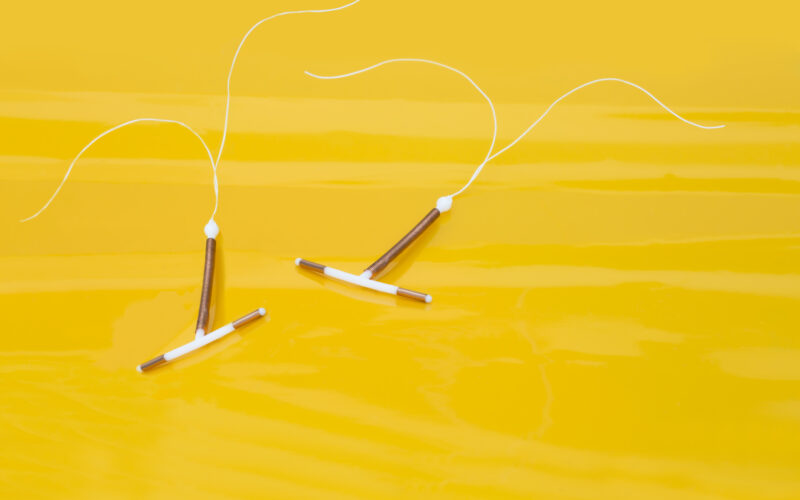The copper IUD is among the few birth-control options that are hormone free, and therefore is sometimes classified as natural. It boasts of extreme effectiveness, with minimal side effects. Because it is non-hormonal, a woman could hypothetically get pregnant the very day it is removed. Once inserted, the device can work for up to 12 years with no further action required by the woman. All this adds up to an option that, on paper, may sound great for those who are fed up with the countless side-effects of hormonal birth control. But is it all it’s cracked up to be? Copper IUD side effects (like the rare, but extremely serious copper toxicity) prove that hormone-free does not equal side effect-free.
It’s true that the copper IUD known as ParaGard is hormone-free, meaning it doesn’t release synthetic hormones into the body the way the hormonal IUDs Mirena, Skyla, and Liletta do. Rather, the copper IUD acts more like a spermicide by destroying the sperm before they can make their way to the egg. At least one study has shown that the copper ions from the copper IUD may function to decapitate sperm—literally separating the head from the tail of the sperm—making motility (movement) impossible [1].
So, if IUDs are having this effect on sperm, what effect are they having on the bodies of the women who choose to have them inserted as a “set it and forget it” method of hormone-free birth control?
Hormone-free doesn’t mean side effect-free
Among the commonly understood side effects of the copper IUD are periods that are initially heavier and longer, which may take up to a year to regulate. Other copper IUD side effects include pelvic inflammatory disease, backache, and pain during sex. A more rare, but extremely serious complication, is when the device may become stuck in the uterus or move through the wall of the uterus causing infection, scarring, or damage to other organs.
Further, some women who have used copper IUDs have developed symptoms consistent with heavy metal toxicity. Excess copper can create symptoms such as fatigue, nausea, depression, irritability, cravings, mood swings, brain fog, among many others.
On an episode of the Fertility Friday Podcast, Julie Casper, a health practitioner who specializes in Tissue and Mineral Analysis, describes a scenario where using the copper IUD can lead to copper toxicity. Casper explains that copper can kill bacteria and fungus (you can even use it in your garden) and how it works well in humid environments. If there is an infection or inflammation in the body, the body may actively draw more copper from the IUD in an effort to fight the infection, which could create an imbalance of minerals and cause symptoms of copper toxicity, like those listed above. For this reason, the Paragard website even says, “Do not use Paragard if you have a pelvic infection, get infections easily,” and so on.
Even without an infection, the copper content in the IUD could harm some women depending on their biochemical makeup. Copper is a nutrient mineral, but it needs to be in the body in the right proportions to other minerals like iron or zinc. Introducing extra copper into the body can throw off the balance and create problems.
As a side note, Casper also notes in the podcast that excess estrogen can cause copper retention, so interestingly, hormonal birth control users may have similar symptoms as those who experience side effects with copper IUDs. Many women actually experience similar symptoms before their periods begin, when estrogen levels increase (a phenomenon known as premenstrual syndrome, or PMS). This is important to be aware of, especially since we are constantly exposed to things that affect our hormone levels.
Copper toxicity?
As we wrote in our Copper IUD FAQ, “While there are no large-scale studies confirming that copper toxicity is a possible side effect for women who use the copper IUD (except for those who have a preexisting condition like Wilson’s disease—Healthline notes that women with preexisting liver disease, hepatitis, anemia, thyroid issues, leukemia, lymphoma, and/or rheumatoid arthritis may also be at risk), anecdotal evidence of the mood-altering effects (often attributed to copper toxicity) of the copper IUD abounds.”
While the copper IUD doesn’t release hormones, it can in fact still alter biochemistry in the body. Dr. Izabella Wentz, author of Hashimoto’s Protocol: A 90-Day Plan for Reversing Thyroid Symptoms and Getting Your Life Back, wrote, “copper is considered a less toxic heavy metal but has been associated with sabotaging thyroid function.” The thyroid—which has significant impact on our reproductive hormones—can be damaged by copper. So, while some tout the copper IUD as the hormone-free option, using it creates a risk of damaging the part of the body that regulates our natural hormones!
One woman described her physical and emotional side effects on Facebook: “these are most of the symptoms I had before getting the IUD removed…. I just want people to be aware that heavy metal toxicity is real and what to watch for. This is something your doctor will not tell you about. Fatigue and exhaustion; hypothyroid; brain fog; headaches; migraines; mood swings; cold hands/feet; depression; dry skin; constipation; racing/pounding heart; concentration and memory [problems]; spaciness; overeating; high anxiety; PMS; bloating. I’ve lost so much hair, it just fell out in globs. Also developed pulmonary hypertension, which is rare and can be caused by excess copper in the blood, while having the IUD.”
So while the copper IUD has been falsely praised as a natural birth control option, it’s worth remembering there is nothing natural about placing a foreign device in your body, and it isn’t as side effect-free as your doctor may think. No one should have to settle when it comes to birth control. Women looking for natural, effective, and side effect-free options would benefit from learning about modern Fertility Awareness Methods (FAM) of family planning. Not only do FAMs prevent pregnancy with effectiveness rates that rival pharmaceutical methods of birth control, they empower women to learn more about their bodies’ natural processes.
References
[1] Ortiz M, Croxatto H. The mode of action of IUDs. Contraception. 1987;36(1):37-53. doi:10.1016/0010-7824(87)90060-6. https://pubmed.ncbi.nlm.nih.gov/3311625/
Have you experienced a side effect of the IUD? Visit IUDalert.com to share your story.
This article was originally published on August 10, 2018. It was last updated on March 21, 2023 to offer more resources. If you’d like to read this article in Spanish, click here: “El dispositivo intrauterino de cobre no es la opción de planificación natural que estás buscando.”








Where are resources that talk about ways to support your body when using the copper iud? Is there any literature on diet or supplements that can be helpful for the body and the effects of this device? Thank you!